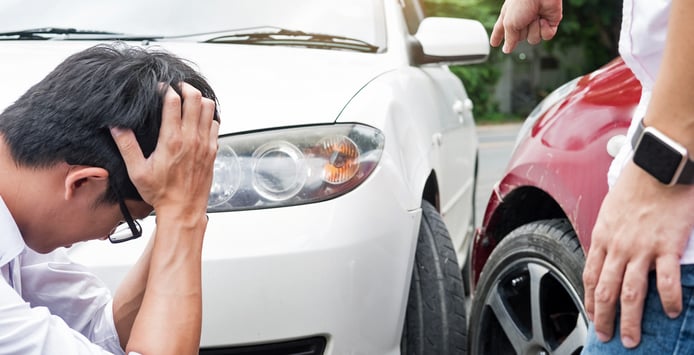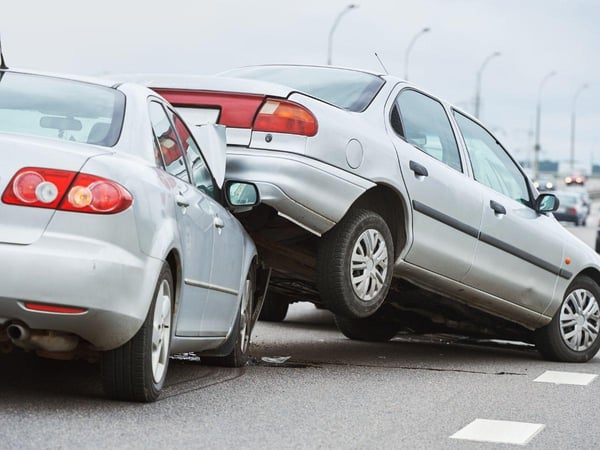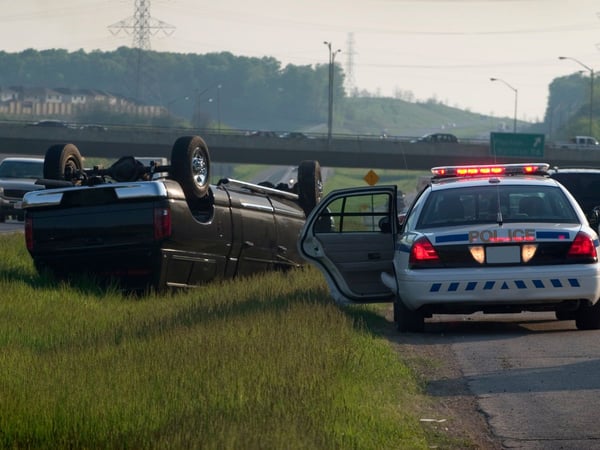
Key Takeaways:
- Fault Determination Complexity: Understanding fault in car accidents is crucial, involving analysis of negligence, physical evidence, and traffic law adherence.
- Types of Negligence Impact: Different negligence laws, such as comparative and contributory negligence, significantly affect compensation eligibility and amounts.
- Legal Guidance Essential: Consulting experienced car accident lawyers is vital for navigating fault determination and maximizing compensation in personal injury claims.
An auto accident can lead to complex legal determinations of fault.
Determining fault in a car accident is crucial for insurance claims and legal processes, as it impacts compensation and liability.
You should not try to establish fault on your own, and always hire a car accident lawyer to help.
This article will explore how fault is established, the role of negligence, and the impact of various factors on fault determination.
Our goal is to clarify an essential aspect of personal injury law - fault determination in traffic accidents.
Table Of Contents
- Determining Fault in a Car Accident
- Types of Negligence
- Investigation by Insurance Companies
- Factors Influencing Fault Determination
- Legal Remedies and Seeking Compensation
- Navigating Fault Determination in Car Accidents
Determining Fault in a Car Accident
Fault determination after an automobile accident is a critical aspect of personal injury law.
Most states follow a fault-based system, where the negligent party responsible for causing the accident is held financially accountable for damages.
Negligence, defined as the failure to exercise reasonable care, is pivotal in determining fault.
Factors such as violating traffic laws, driving recklessly, or not adhering to speed limits can all contribute to a finding of negligence.
The legal process of fault determination involves assessing the degree of fault of each involved driver.
This assessment is based on principles of negligence liability.
It may involve comparative negligence laws, which allow for the allocation of fault between parties.
Understanding the definition of negligence and its implications is essential for accident victims seeking compensation or pursuing a personal injury claim.
Insurance companies and legal professionals work to establish the negligent party by comprehensively analyzing evidence from the accident scene, witness statements, and police reports.
This determination is crucial for resolving insurance claims, determining liability coverage, and guiding the legal proceedings in accident lawsuits.

Types of Negligence
Negligence is a key concept in determining fault in auto accidents.
Three main types of negligence laws impact compensation and liability:
- Strict Comparative Negligence: This legal framework allows accident victims to seek compensation even if they are partially at fault. The compensation reward is reduced by the percentage of fault attributed to them. For example, if a driver rear-ends another vehicle but the leading driver had a broken tail light, both parties may be found at fault, with compensation adjusted accordingly.
- Modified Comparative Negligence: Under this system, a party can recover damages only if their degree of fault is below a certain threshold, typically 50%. If their fault percentage exceeds this limit, they are barred from receiving compensation. This encourages drivers to exercise reasonable caution and adhere to traffic laws to avoid being deemed primarily responsible for an accident.
- Pure Contributory Negligence: This strict approach requires the injured party to be completely free of fault to recover damages. In states adhering to pure contributory negligence, even a minimal degree of fault can prevent a party from receiving compensation for their accident injuries.
Understanding these types of negligence is empowering for accident victims navigating the legal process.
This knowledge gives you the power to influence the outcome of your personal injury claims and insurance settlements.
Investigation By Insurance Companies
Insurance companies conduct a thorough investigation to determine fault after a car accident.
A critical component of this investigation is the police report, which provides an official account of the accident scene, including any traffic violations or evidence of negligent driving.
Insurance adjusters heavily rely on this report to assess the fault of the involved drivers.
Insurance companies also gather physical evidence from the accident scene to support their fault determination.
This can include photographs of vehicle damage, skid marks, and the location of the collision.
Such evidence helps reconstruct the accident and understand the dynamics that led to it.
Providing accurate and factual information to insurance adjusters is crucial for a fair assessment of fault.
Drivers should avoid admitting fault at the scene or during the investigation, as the full extent of contributing factors may not be immediately apparent.
By presenting clear evidence and cooperating with the investigation, parties involved in an auto accident can ensure a fair and objective determination of fault by the insurance company.
Factors Influencing Fault Determination
Several factors are crucial in the fault determination process after an auto accident.
The analysis of physical evidence is paramount, as vehicle damage, skid marks, and the accident location provide tangible insights into how the collision occurred.
Insurance adjusters and accident reconstruction experts carefully examine this evidence to ascertain the extent of damage and the dynamics of the crash.
Witness testimony is another critical element in establishing fault. Statements from eyewitnesses, fellow drivers, and passengers can offer valuable perspectives on the accident, corroborating or contesting the accounts provided by the involved parties.
This testimony can be instrumental in clarifying the sequence of events and determining each driver's degree of fault.
Traffic laws and violations play a significant role in fault determination.
Violating speed limits, running a red light, or engaging in reckless driving behaviors are clear indicators of negligence.
Law enforcement officers and insurance companies assess these violations to establish the drivers' legal responsibility and determine the percentage of fault attributable to each party.
Insurance companies and legal professionals strive for an accurate and fair determination of fault.
This is crucial for resolving insurance claims and personal injury lawsuits.

Legal Remedies and Seeking Compensation
Victims of automobile accidents have several legal remedies available to seek compensation for their injuries and damages.
Pursuing a personal injury claim is a common course of action.
This allows accident victims to recover compensation for medical expenses, lost wages, and emotional distress.
The outcome of these claims often hinges on the determination of fault, as it directly impacts the liability of the involved parties.
The impact of fault determination extends to insurance claims and rates as well.
Insurance companies adjust premiums based on the fault assigned to their policyholders in accidents.
A finding of negligence can lead to increased insurance rates and affect the policyholder's financial responsibility in future claims.
Given the complexities of fault determination and its implications, it is crucial to consult an experienced car accident lawyer.
A knowledgeable personal injury attorney can provide invaluable guidance throughout the legal process, from gathering evidence to negotiating with insurance companies.
Their expertise ensures that accident victims understand their rights and options for seeking compensation, maximizing their chances of a favorable outcome in their personal injury claim.
Navigating Fault Determination in Car Accidents
Understanding fault determination is a cornerstone of navigating the aftermath of an automobile accident.
For those involved in car accident cases, seeking legal advice is paramount.
An experienced car accident lawyer can provide crucial guidance, from evaluating the evidence to advocating on your behalf.
The Law Offices of Julian Lewis Sanders & Associates offer expertise in personal injury law, ensuring that your case is handled with the care and attention it deserves.
If you've been involved in a car accident in Georgia and are unsure about fault determination or how to pursue a personal injury claim, don't hesitate to reach out to us.
We offer a free consultation, during which our dedicated legal team will guide you through the complexities of the legal process and help you secure the compensation you're entitled to.
Posted by Julian Lewis Sanders
At The Law Offices of Julian Lewis Sanders & Associates, we understand the gravity of personal injury situations - it's our priority. Committed to aiding you in your time of need, we specialize in listening to your story, discerning your individual needs, and swiftly executing strategic actions to secure the compensation you deserve. Based in Georgia, our legal team comprises experienced personal injury attorneys dedicated to delivering optimal service tailored to your unique circumstances.
Facebook




